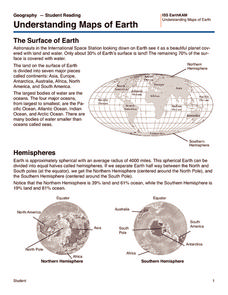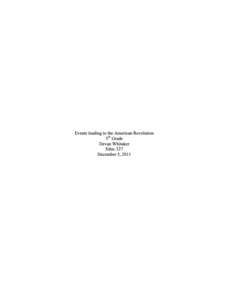Curated OER
Indians of the Plains
Second graders, in groups, explore the Plains Indians and explore how the physical climate of the Plains region affected their lives.
Curated OER
A Bishop's Description of the Christianized Indians of Spanish Florida, 1675
Students explore mission life in La Florida as observed by a Spanish bishop who visited in the 1670s. In this Spanish Florida lesson, students recognize the value of primary sources in illuminating the past and consider factors such as...
Curated OER
Maps of Indian Territory, the Dawes Act, and Will Rogers' Enrollment Case File
Learners, in groups, analyze one map at a time, first the 1885 map, then the 1891 map. After they have completed the analysis sheets, they compare the two maps and answer questions imbedded in the plan.
Curated OER
Lesson One: The Three Perspectives on Native American Removal
Eleventh graders explore the impact of the Indian Removal Act. In this US History lesson, 11th graders analyze primary resources.
Curated OER
Centennial: But Mom, I Have Nothing To Wear
Fourth graders examine the contributions of Native American Indians, explorers, and Utah's pioneers. They discuss ways in which clothing can communicate and help identify time periods, thoughts, and values.
Curated OER
Black Hawk and the Black Hawk Trail
Fourth graders investigate the American Indian tribe of Black Hawk and its trail. They use computers and a variety of technology resources to find information and put together a multimedia presentation. The end result is a storyboard...
Curated OER
Native American Project in Microsoft Word
Third graders participate in a lesson that is aimed at helping them advance in word processing skills by using Microsoft Word. The focus of the research is upon a Native American Indian tribe.
Curated OER
Foreign Miners
Pupils examine primary source documents from miners who went to California in the search of gold. They compare and contrast the letters they read and discuss what types of discrimination still exists today.
Curated OER
Native Americans: People of the Plains
A Venn Diagram invites learners to compare the roles of men and women in Native American societies. Learners write down as many ideas as they can, including roles that men and women shared
Curated OER
Surviving the Winter
Fifth graders investigate given cultures using the internet, personal interviews and other sources, They examine how the civilizations of six Native American tribes and six Australian Aboriginal tribes survived during their respective...
Curated OER
How Much is There to Eat?
Students examine food production related to population density. In this interdisciplinary lesson, students gather data regarding food production in the American South and in India. Students follow the outlined steps to calculate the...
Curated OER
Taste of India
Bring a little taste of India into the classroom. This colorful presentation provides information regarding India's people, food, location, religion, and culture. An interesting trip to a fascinating place. Tip: Make it a real taste of...
Institute for Geophysics
Understanding Maps of Earth
Here is your go-to student resource on primary geography concepts, including facts about the surface of the earth and its hemispheres, latitude and longitude, globes, types of maps, and identifying continents and oceans.
Race Briges Studio
I am Indopino: Or, How to Answer the Question, "Who Are You?"
In our increasingly multi-ethnic society, many learners find it difficult to identify themselves as belonging to any one ethnicity. Gene Tagaban, a Tlingit, Cherokee, Filipino offers his personal experiences with these questions in his...
University of Wisconsin
We're Off to India!
Pack your bags and set off to the wonderful country of India in a multi-day cultural unit. The lesson is a 17-day series focusing on literature, music, art, geography, and the culture of India. Scholars complete several activities,...
Smithsonian Institution
Native Resistance: Native Resistance Then and Now
Native Americans lost so much—and gained so little in return. Scholars explore Native Americans' resistance to the United States government. The lesson plan uses primary sources to explore the different forms of protest and gives a voice...
University of California
Influences from South to Southeast Asia
In ancient times, people along trade routes exchanged ideas in addition to goods. Scholars view eight primary sources, such as artwork, to understand how India influenced southern Asia. Academics participate in a short group discussion...
NOAA
Into the Deep
Take young scientists into the depths of the world's ocean with the second activity of this three-part earth science series. After first drawing pictures representing how they imagine the bottom of the ocean to appear, students...
Curated OER
The Seven Continents Scavenger Hunt
Who doesn't enjoy an engaging scavenger hunt? Here, scholars listen to, and discuss, the informative text, Where is my Continent? by Robin Nelson. They then explore the seven continents and four major oceans using Google Earth.
Teaching History
Jamestown: The Starving Time
Students analyze a variety of primary and secondary sources to determine the cause of the Jamestown starving time during the winter of 1609–1610.
Jamestown-Yorktown Foundation
Making a Patriot Inquiry: Are Independence, Freedom, and Liberty the Same Thing?
As part of a study of the American Revolution, class members engage in an inquiry-based lesson that has them watch a scene from the play Slave Spy, examine multiple primary source documents, and then discuss the similarities and...
Manchester University
Events leading to the American Revolution
The Stamp Act, Paul Revere's ride, and the Boston Tea Party pushed American colonists to the tipping point that led to the American Revolution. Fifth graders research the key figures of the war, study the Declaration of Independence, and...
California State University
Life in the Missions of California
Academics explore the topic of life in California Missions for Native Americas. Class members complete a research activity, respond to writing prompts, and engage in hands-on-activities to learn who lived in the missions and what life...
Stanford University
Siege of Golconda
Looking at art, learners explore the Mughal Empire, which once controlled all of India and created a unique Hindu-Muslim civilization. By analyzing a painting of the Siege of Golconda, historians consider what art teaches people about...
Other popular searches
- American Indians
- Sioux Indians
- Iroquois Indians
- Cherokee Indians
- Eastern Woodland Indians
- Wampanoag Indians
- Native American Indians
- Indians and Pilgrims
- Navajo Indians
- Lakota Sioux Indians
- Lakota Indians
- American Indians Lesson Plans

























